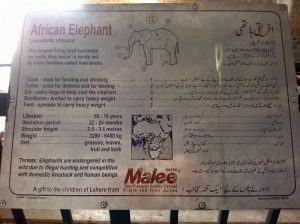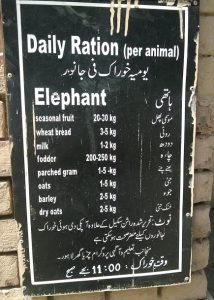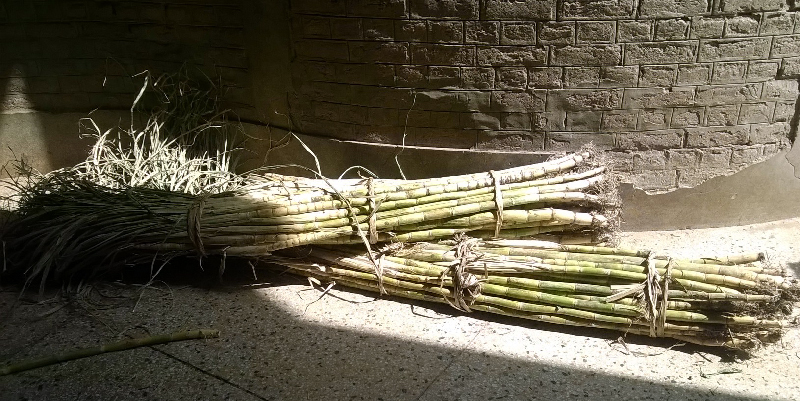Lahore: Suzi, the female elephant in Lahore Zoo, has turned 30. During last 24 years, she has never experienced the pleasure of living in harmony with her own species with no one to understand her feelings and sentiments.
Lahore’s zoological garden, established in 1872, is one of the most famous and well-maintained recreational spots for the general public, as opposed to other zoological parks.

Operating as a self-sustained organization in the provincial capital of Punjab, Pakistan; Lahore Zoo had purchased a 6 year old, female African bush elephant in 1992.
“The calf was named ‘Suzi’ due to her friendly, docile demeanor,” said Shafqat Ali, Director Lahore Zoo, in an interview with News Lens Pakistan. Due to shortage of funds and the unavailability of African elephants, she was brought alone and not in a pair, said Ali.
However, recent recommendation issued by World Association of Zoos and Aquariums (WAZA), as outlined in the accreditation standards and related policies 2016, states, “Each zoo holding elephants must have a minimum of three females (or the space to accommodate three females), two males or three elephants of mixed gender.”
Senior Researcher, Kiran Saleem admitted covertly that Suzi has never experienced mating.
Lahore Zoo authorities were unable to solve habitat management related issues, financial constraints and above all, problems related to a lack of space for housing at least two elephants and their progeny since 1992. As, Mr. Shafqat Ali said that no procurement plan for buying Suzi’s mate have been drafted since her presence in the Zoo.
Kiran Saleem disclosed to News Lens Pakistan via telephonic conversation: “A summary of Rs 322.17 million budget allocation has been moved to Department of Forestry, Wildlife and Fisheries Punjab by Lahore Zoo, in which animal procurement has been given key importance with a budget allocation of Rs 114.95 million.”
To the utter amazement of News Lens Pakistan, she said, “We have not included the cost for a partner for Suzi in this animal procurement plan, as she is past the prime of her fertility.”
While discussing captive mating and breeding, Director Lahore Zoo Ali said, “Mating is not the primary purpose of Zoos, even according to the international standards recommended by World Association of Zoos and Aquariums (WAZA).”
On the contrary, the worldwide conservation status of the African bush elephant has been declared as endangered according to wildlife experts.
While addressing concerns regarding the captive conservation of this species, Dr. Jawad Ahmed, Senior Animal Specialist of Veterinary Hub Pakistan (an NGO) said, “Captive African Bush Elephant’s will be demographically extinct in Asia during the next two decades.”
He said that out of all mammalian species, the innate desire for mating is 60 percent higher in elephants.
Dr. Waleed, Senior Veterinary Surgeon at the well-known Ghora (horse) Hospital of Lahore, told News Lens via telephone, “The prime reproductive-age of a female African mammal is in between 10–30 years, during which mating not only gives them the opportunity to display their natural desires but it will also help with conserving this species under caretaker captivity.”
While discussing Suzi’s captive mating requirements, Ali said, “It is impossible for us to bring a male for her, considering her age and reproductive status. The transportation charges, habitat management, food, housing space for another adult elephant and behavior management of a male elephant of Suzi’s age is above the financial and professional capacity of the Lahore Zoo.”

Moreover, a food expenditure of Rs 14 lac for an elephant can only be sufficient to keep Suzi in good health. We cannot add another member in such a constrained budget, added Kiran.


Senior Veterinary Officer, Dr. Babar Saleem told News Lens Pakistan that Suzi is tied with a single foot chain from 7pm- 4am, as late evening to early night hours are of profound sexual activity in this species.”
Mohammad Hussain, caretaker of Suzi, said, “She shows signs of activeness and restlessness at that time.” He further added that she does not want him to come close to her during these particular night timings.
Kiran claims confidently, “The habitat, diet and captive management measures especially for Suzi, the royal animal of Lahore zoo, have been taken in accordance with WAZA standards; that is why copulation is not an issue to be tackled,”
Dr. Saleem, confirmed that initially, the female elephant was chained for a short period of time. “However, we managed her innate desires by keeping her busy with increased human interaction and a long exercise routine,” he explained.
He said that she takes a walk regularly on the zoo tracks from 7am to 9am, during which she is overjoyed to see other animals in their enclosures. .Suzi’s ‘Hello’ with her trunk to the rhinoceros living beside her enclosure is a pleasurable sight for all of us.
This depicts a sad reality; Suzi has never experienced the pleasure and excitement of mating, she may never get the chance to breed a calf of her own.
Expressing an altogether different view point, Dr. Jawad Ahmed, a vocal advocate of animal rights, says, “The sole purpose of an animal’s natural expression is not merely breeding. Breeding is the outcome of copulation which is crucial for elephants, even if breeding does not occur. Almost 29 percent of captive African female elephants worldwide have been incapable of breeding a calf due to complex reproductive pathologies. Yet, they have been living in groups with males to mate as well.”
Kaavan, an Asian elephant, is chained and sedated in the Islamabad Marghzar Zoo, after his mate named Saheli died back in 2012. He faces problems similar to Suzi’s.
Kaavan’s plight drew a global outcry when an online campaign ‘Free Kaavan’ was launched in 2015, and it has been signed by 395, 245 animal rights advocates across the world.
Dr. Waleed said, “The confinement and isolation of the animal has caused him enough pain, primarily after Saheli’s death since 2012, when his psychosocial and physiological needs were not catered to by the City Development Authority of Islamabad. They did not bring in another female Asian elephant or send him to an elephant sanctuary.”



